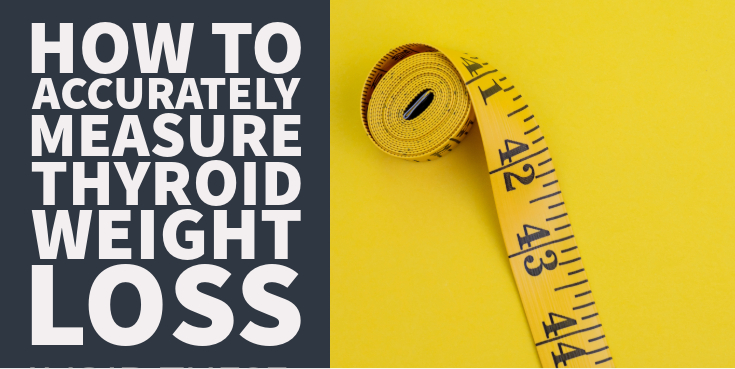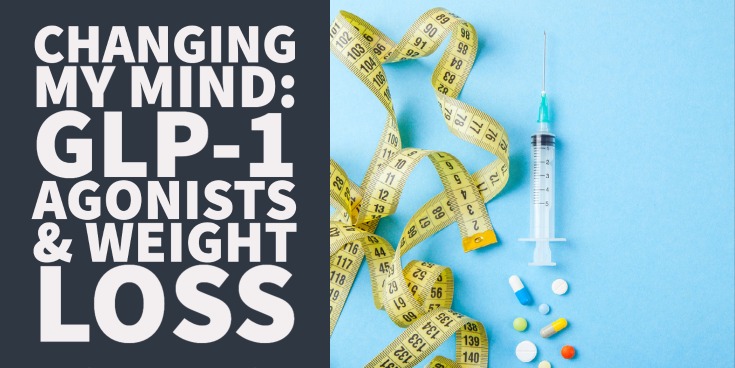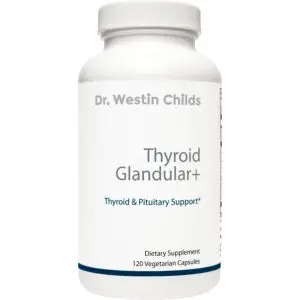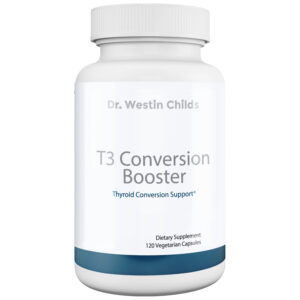Metformin may be one of the cheapest and most underused weight loss medications out there.
Metformin is traditionally reserved for those with diabetes or insulin resistance, but many studies show that it can be effective in overweight or obese patients without diabetes.
The only problem?
You wouldn’t know about it unless you do the research yourself!
Use this post to learn everything you need to know about using metformin (both if you have diabetes or if you are simply just overweight):
Metformin & How it May Help With Weight Loss
Does metformin help with weight loss?
The answer is more complex than just a standard “yes” or “no”, instead the correct answer is more of a “maybe”.
What do I mean?
Well, metformin is a medication that falls into the class of biguanides.
The most popular of these medications is metformin (and the topic of our discussion today) which is being used by at least 120 million people worldwide.
Classically, metformin is used to treat blood sugar issues, insulin resistance, and type II diabetes.
It was found a long time ago, that if used for these conditions, metformin does indeed help some patients lose weight.
Studies have shown (1) that patients who take metformin with insulin resistance do tend to lose weight – most studies show a “modest” amount to the tune of around 5-10 pounds.
Because these studies have been favorable to some patients (especially those with the conditions listed above), it’s normal to ask if it also works for patients who don’t have type II diabetes.
In order to understand that, we need to understand how metformin works.
As it relates to weight loss metformin has powerful actions in 2 main areas:
In the mitochondria respiratory chain complex (2):

Activating the mitochondrial pathway is a powerful way to increase energy production and therefore metabolism in the entire body.
Metformin improves and increases the efficiency of energy production in your mitochondria.
We will discuss how this benefits your resting metabolism later in this post.
And in the liver by reducing gluconeogenesis and reducing insulin resistance (3):
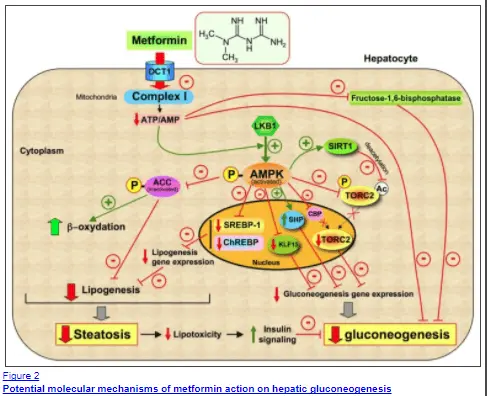
Secondly (and perhaps more importantly) is that metformin alters the production of glucose and the sensitivity of insulin in your liver and in other cells in your body.
This effect may be the primary method by which metformin exerts a powerful anti-obesity effect in many individuals.
This mechanism of action is also why metformin is commonly prescribed for diabetics or those with insulin resistance.
Now that we know how it works we can talk about how to use it properly and IF it will work for you.
While metformin was specifically designed (and most often prescribed) to those with diabetes it can actually be used in normal, overweight patients with potential benefits.
The goal here is to understand how to use it:
Metformin in Non-Diabetics
The main question that most people have is this:
Will metformin help me lose weight if I don’t have diabetes or blood sugar issues?
The answer to that question is probably…
First, let’s start with the science, then I’ll give you my opinion based on treating hundreds of patients:
Does science suggest that metformin will help with weight loss in non-diabetics?
Yes, studies have shown (4) that metformin may indeed help with weight loss in patients without diabetes.
In this particular study, patients were given metformin (2,500mg per day) for up to 6 months.
Patients treated with metformin lost on average 10-14 pounds (5.6% to 6.5% of body weight) compared to controls who gained 6-8 pounds during the same time period.
What’s interesting is that the percentage of weight loss achieved in each individual was independent of age, sex, or BMI.
This means that if you are only 5-10 pounds overweight, it’s not likely that metformin will help you lose ALL of that weight, instead, it may only help you lose a couple of pounds.
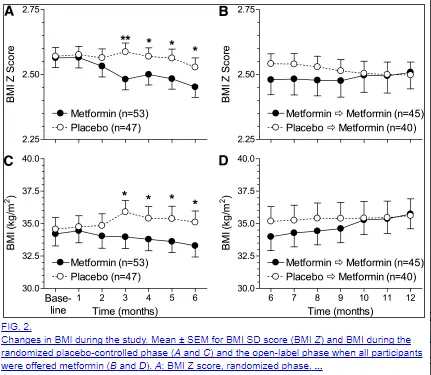
On the other hand, if you are 40-50 pounds overweight, then you may lose more than the traditional 5-10 pounds.
So how is metformin working to help patients lose weight?
The exact mechanism of action is still unclear but it probably boils down to a few important areas:
#1. Most people have some degree of insulin resistance whether they realize it or not.
It’s estimated that up to 50% of the population of the United States has insulin resistance as defined as pre-diabetes or diabetes (5) (whether they realize it or not).
Insulin resistance is defined as having elevated insulin levels despite fasting and/or having an elevated blood sugar (usually higher than 90-100 over a 12-hour fast).
Moral of the story?
Even if you are 5-10 pounds overweight there is still a HUGE probability that you have some degree of insulin resistance.
Remember:
Diabetes doesn’t just develop overnight.
It’s a disease that exists on a spectrum and it slowly develops over 10-20+ years (depending on the person).
Those with even mild insulin resistance (who may one day develop diabetes) stand to benefit from the glucose-lowering effects of metformin which may be on the reasons that it helps most people lose at least some weight.
#2. Metformin may help reduce or normalize appetite.
Secondly, metformin has been shown to modulate appetite (6).
Most people would consider a reduction in appetite a good thing, and in some cases, it may be, but in most cases, it may be damaging.
You never want to eat too few calories for too long or it will cause severe metabolic damage.
Having said that, some people do suffer from conditions that may cause an increase in appetite that is almost uncontrollable.
Conditions such as leptin resistance (which modulates brain satiety), food addiction, and binge eating disorders all result in the consumption of excess calories which may lead to weight gain long term.

Unfortunately, it’s not as easy as just reducing calories in these people because there are powerful hormones that influence appetite.
One way to combat this is by taking medications that “normalize” your appetite (notice I didn’t say reduce your appetite).
You only want to reduce your appetite if you KNOW that you are consuming too many calories.
Metformin may help to normalize caloric consumption and promote energy production thus stabilizing basal metabolic rate and caloric consumption.
#3. Metformin may improve muscle mass, energy production and therefore your metabolism.
Lastly, metformin has been shown to improve metabolism through a variety of factors.
Whenever insulin resistance is present your muscles will start to atrophy.
Why?
Because insulin directs excess calories straight to fat cells which necessarily reduces the number of calories available for muscle use.
Think of it as a tug-of-war between your muscles and your fat.
You always want your muscles to win that war because then those calories will be used and burned up as energy.
If your fat cells win that war then they will grow and you will gain both fat mass and weight!
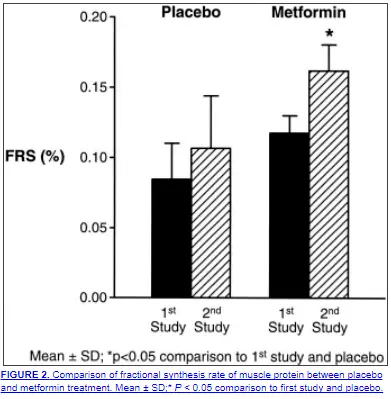
Insulin tips this balance in favor of fat cells which necessarily causes atrophy of muscle tissues.
This is one of the reasons why severely obese patients have very small muscle mass and muscle volume (they are starving from the inside even though they consume massive amounts of food).
Taking metformin will increase muscle metabolism (7), and promote muscle growth all by reducing insulin resistance and insulin sensitivity.
Metformin in Type II Diabetics
Will metformin work for you if you have insulin resistance, high blood sugar, or a diagnosis of type II diabetes?
There is a VERY high chance that it will help you lose some weight. How much weight is a different question entirely.
How much weight you lose will depend on the status of your diabetes, how much insulin resistance is present, and if you are taking insulin already.
Metformin has been shown to help those with type II diabetes in many studies:

The effect of weight loss in those with type II diabetes is around 5-10 pounds (if it will help you lose weight).
The problem with using metformin in those with type II diabetes is that in order to sustain the weight loss that they may achieve while using it, they have to continue to use it indefinitely.
If you lose 5-10 pounds while taking metformin, and then stop the medication, that weight is very likely to come right back.
With that in mind there are a few things you should consider if you are using metformin for weight loss and you have blood sugar issues:
#1. You need to make sure you are on the right dose
We will discuss the dose below, but for now, just realize that in order for the medication to be effective you need to be taking enough of it.
Taking a small dose of 500mg per day and hoping for the best is not a good approach.
#2. You should never use metformin as a monotherapy for weight loss.
Second, and probably more important, is that you never want to use JUST metformin by itself.
Metformin, by itself, is not a strong or powerful medication.
It becomes more powerful and more effective when it is combined with other therapies and lifestyle changes.
As you will read in most studies, they always recommend the COMBINATION of metformin with changes to your diet and exercise routine.
Beyond these basics, you will also want to consider combining metformin with not only other medications but also with other supplements.
Believe it or not, many supplements have been shown to be just as effective at reducing blood sugar as metformin.
By combining supplements with metformin you can improve your weight loss results but also keep your dose of metformin down lower (thus reducing negative side effects).
Metformin Dosage for Weight Loss
Is there a dose that you need to be taking in order to achieve weight loss with metformin?
Some people may not realize it, but dosing matters quite a bit – especially with weight loss (of all medications and supplements).
In order to obtain certain and specific results, you must ensure that you get enough of the substance you are consuming to achieve therapeutic benefit.
Metformin is no different.
Taking 500mg of metformin daily is not likely to help you with weight loss! And this is a standard starting dose of metformin that most physicians give out.
The dosing of metformin typically ranges from 500mg to 2,500mg per day.
Does this mean that you need to jump up to 2,500mg per day to get results?
Maybe, but there is a smarter way to approach dosing.
You should consider the therapeutic dose of metformin to be somewhere between 1,000mg to 2,000mg per day.
What this means is that you need to be taking somewhere between 1,000mg to and 2,000mg per day in order to get optimal results.
It’s also worth pointing out that if you see some weight loss at 1,000mg per day you may not double those results simply by taking 2,000mg per day.
Why?
Because of a concept known as diminishing returns (which applies to MOST medications and MOST supplements).
Basically, once you have achieved some level of saturation in your body of metformin, further increases in metformin won’t increase your results.
Now how do you know where to start?
In general, you can follow these guidelines:
If you are using metformin as monotherapy (meaning metformin is the only medication you are taking – which I don’t recommend) you should be taking a higher dose.
If you are using metformin as one of several therapies (which I do recommend) then you can get by with lower dosing of metformin – around 1,000mg per day.
The bottom line?
Make sure you are taking ENOUGH metformin to ensure proper cellular function before you give up and say it doesn’t work.
More important than how to use metformin by itself, is how to use it in conjunction with other therapies…
Combining Metformin with Other Therapies
Without a doubt, the best way to use metformin is in combination with other therapies.
This includes in combination with prescription medications and in combination with targeted supplements.
Why is that?
The reason is simple:
Weight gain is a complex process that involves multiple hormone systems and regulatory processes.
That means using 1 medication or targeting 1 pathway means you are only treating PART of the problem and not ALL of the problem.
In addition, adding other therapies allows you to synergize therapies and treat the same problem from multiple angles.
So which medications help boost the effectiveness of metformin?
Below I’ve outlined several therapies including how to get further information on each of them:
- GLP-1 agonists –> these medications help lower insulin and leptin and lead to considerable weight loss if used by themselves.
- Naltrexone (Low dose naltrexone) + Wellbutrin (or either by themselves or in combination as Contrave) –> These medications help alter appetite and primarily modulate appetite and body set point and tend to work in specific people.
- Cytomel or other thyroid medications –> Many patients who suffer from obesity have low T3 levels or some element of thyroid hormone suppression.
As an example, you can see the combination of a GLP-1 agonist plus metformin resulted in far greater weight loss than just either alone.
This study (8) compared metformin by itself to Victoza by itself to the combination of metformin plus Victoza.

Alternatively, you can also use certain supplements to boost weight loss with metformin.
I recommend using supplements that target the insulin resistance pathway or other supplements which have scientific data proving their efficacy:
- Fish oil –> Fish oil has been shown to increase muscle mass, reduce inflammation and directly lead to weight loss. Using up to 3 grams per day is optimal for these results (you can read more about fish oil here & weight loss here).
- Berberine –> Berberine helps to reduce blood sugar, and insulin resistance and promotes muscle growth. To get these benefits you need to take up to 1,000 mg per day.
- Alpha lipoic acid –> Alpha lipoic acid (or ALA for short) is a powerful anti-inflammatory agent which also helps with weight loss if used in high enough dosages. Use up to 1,200mg per day for best results.
- Probiotics –> Probiotics help normalize appetite, reduce caloric absorption and increase metabolism. You can learn all of the ways that probiotics help with weight loss here. The weight loss dose for probiotics is around 200-300 billion CFU of multi-potency bifido/lacto species.
Is it Safe to Try Metformin for Weight Loss?
After reading all of this information it may be tempting to jump on the bandwagon and make an appointment with your doctor to get metformin, but does that mean you should?
Like anything, you need to make sure the benefits outweigh the risks.
When it comes to metformin the potential negative side effects, and therefore downside is very low.
Metformin is generally a very well-tolerated medication with the most common side effect being mild gastrointestinal distress that is usually dose-dependent.
Rarely, some patients may have more serious conditions such as lactic acidosis (9) – but this side effect is very rare and very difficult to miss.
All of the side effects of metformin resolve upon discontinuation of the medication, further reducing the risk of any potential downsides.
If you decide to start metformin you will need to start out at a low dose and slowly titrate your dose up to higher dosages (as tolerated).
If you start low and go slow you will dodge most gastrointestinal issues.
Another potential benefit of using Metformin is the price.

The cash price (with or without insurance) is $4.00 for a month’s supply.
While some supplements may be more effective than metformin, they can often cost significantly more, so this provides a viable alternative for those that need to be cost sensitive.
If possible you should combine metformin with supplements for better results, however!
*Note: Because someone almost always asks, I don’t have any connection with the pharmaceutical company that creates metformin. I simply provide this information to help those that may benefit from it.
Will your Doctor Prescribe it?
Compared to other medications that I discuss on my blog, metformin is actually rather easy to get from your physician.
The reason is simple:
Physicians are used to prescribing metformin because it’s one of the most commonly prescribed medications for diabetics!
It may take some convincing to get your doctor to prescribe metformin for you for weight loss (especially if you aren’t significantly overweight) even though studies indicate it does help in nondiabetic patients.
The best way to get around this is to simply print out an article listed in this blog post and bring it to your doctor.
Doctors understand the language of clinical studies and will be very likely to provide you with a prescription if you provide sources that prove it is effective.
Remember:
Your starting dose should be around 500mg per day but you will need to get up to 1,000 to 2,000mg per day for optimal results.
It can also take several months to achieve these results, so don’t get impatient.
Back to you
Let’s wrap it up:
Metformin is a great, cheap, and effective medication that may help with weight loss in those patients who are diabetic and those who are not.
Metformin works by targeting insulin and glucose pathways in the body and by directly altering both liver and mitochondrial function.
The net effect of these changes results in weight loss that tends to be based on your starting BMI.
It’s also a relatively safe medication to take and can be combined with other therapies such as supplements and other medications for even greater benefit.
Now I want to hear from you:
Have you been thinking about using metformin for weight loss?
Did it work for you?
Why or why not?
Leave your comments below!




